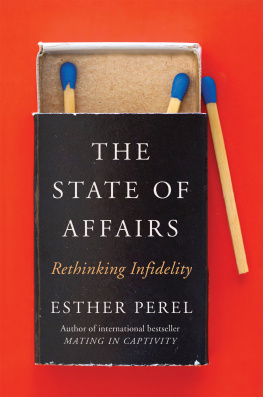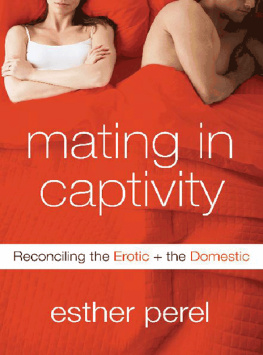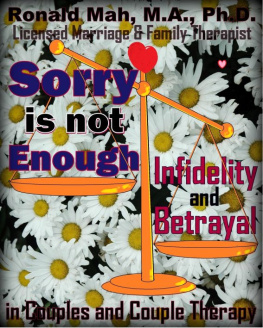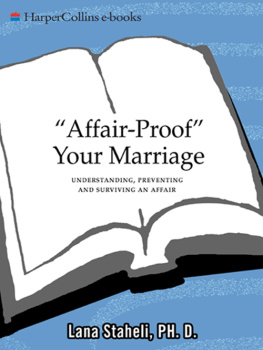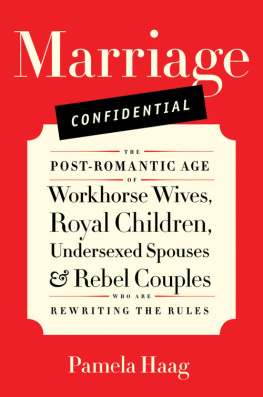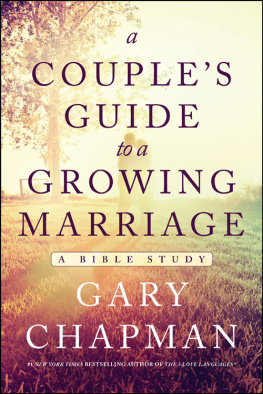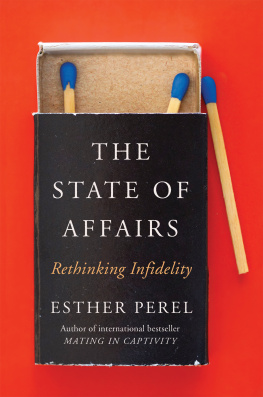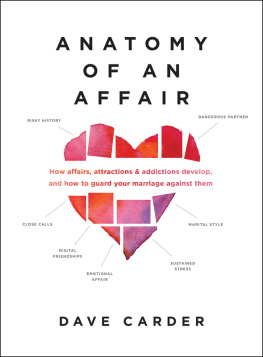Contents
For Jack,
whom I have loved for three decades,
and
for anyone who has ever loved.
There is one simple act of transgression that can rob a couple of their relationship, their happiness, their very identity: an affair. Yet this extremely common act is poorly understood.
I have been probing the intricacies of love and desire in modern couples for almost three decades as a therapist, writer, trainer, and lecturer. My first book, Mating in Captivity, explored the nature of erotic desire in long-term relationships and included a single chapter on infidelity. To my surprise, every time I gave a talk or an interview about my book, no matter where in the world, the topic of infidelity took precedence over all others. It would come to consume my waking hours. Whereas Mating in Captivity probed the dilemmas of desire within committed relationships, The State of Affairs tracks the trajectory of desire when it goes looking elsewhere.
That being said, this is not just a book about infidelity. Affairs have a lot to teach us about relationshipswhat we expect, what we think we want, and what we feel entitled to. They offer a unique window into our personal and cultural attitudes about love, lust, and commitment. Through examining illicit love from multiple angles, I hope to engage you, the reader, in an honest, enlightened, and provocative exploration of modern relationships in their many variations. I would like to stimulate a conversation between you and your loved ones about issues such as fidelity and loyalty, desire and longing, jealousy and possessiveness, truth-telling and forgiveness. I encourage you to question yourself, to speak the unspoken, and to be unafraid to challenge sexual and emotional correctness.
My role as a therapist is to create a safe space where the diversity of experiences can be explored with compassion. As an author, I hope to do the same. In that sense, this is not a prescriptive book for overcoming the crisis of an affair, though I hope it will be helpful to those of you who are currently in the midst of one, whatever part you are playing. Instead, my goal is to introduce a more productive conversation about the topic, one that will ultimately strengthen all relationships by making them more honest and more resilient.
The conversation about affairs today tends to be divisive, judgmental, and shortsighted. As a culture, we are ever more open about sex, but infidelity remains shrouded in a cloud of shame and secrecy. I hope this book will help to lift that silence and launch a new way of thinking and talking about one of our most ancient ways of being. Much has been written about prevention and recovery; much less about the meanings and motives of affairs. Even less has been said about what we can learn from them and how it might inform and transform our relationships.
Some people will dismiss these as irrelevancies. Only the facts matter, they tell me. The plane is down; grab the survivors and run. But more and more people come to me because they want to know what happened, why it crashed, and whether it could have been prevented. They want to understand it, learn from it, and fly again. For all of these people, I would like to start the conversation where it usually stops and tackle some of the more unsettling questions that infidelity raises.
In the pages ahead I will explore the many faces of affairsaddressing the pain and destruction of betrayal as well as the thrill and self-discovery inherent in transgression. I want to parse the tension between the expansive opportunities of an affair and the imminent danger that is immediately attached to it. What are we to make of the duality between the liberating and empowering dimensions of adulterous love and the damage that it can inflict?
I also want to include the broader circles of family, community, and culture. I hope to root this discussion of our most personal relationships in a broader historical and social context.
In broaching a different kind of discussion on this most inflammatory subject, I am well aware of the risks I take. Beliefs about infidelity run deep in our cultural psyche, and questioning them will no doubt be perceived by some as dangerous irreverence or as a compromised moral compass on my part. While I prefer to sidestep flat-out condemnation to allow for a thoughtful inquiry, I do not approve of deception or take betrayal lightly. I sit with the devastation in my office every day. Understanding infidelity does not mean justifying it. Yet in all but the most extreme cases, residing in the flats of judgment is simply not helpful.
Let me tell you a bit how I have gathered the information for this book. Mine is not an evidenced-based scientific survey, nor is it a sociological study based on data collected by the various websites for people seeking affairs. Rather, my approach is akin to that of an anthropologist and an explorer. I talk to people, and I listen. The raw material for this book has come from my therapy sessions, trainings, lectures around the world, informal conversations, and from the hundreds of people who have sent me letters and left comments on my website, my blog, my TED Talks, and my Facebook page.
In my psychotherapy practice, I have focused for the past six years primarily on couples dealing with infidelity. With these people, I have plumbed the depths of the subject. Because I meet with partners alone as well as together, I have been afforded an unusual window into the experience of the unfaithful partner, not only the pain of the betrayed. I am fortunate to work with people from around the globe, which has helped me to provide different cultural perspectives, but I am aware that my patientsbeing self-selecteddo not necessarily represent a diversity of economic and social groups.
Affairs and secrets go hand in hand, and this book contains many secrets. Often it is impossible to tell one persons secret without betraying anothers. Some of the details that give a story its signature poignancy are exactly the ones I had to conceal for confidentialitys sake. Every person in this book has been carefully disguised to protect his or her anonymity, but I have striven to preserve their particular words and the emotional accuracy of each scenario.
Finally, a note of gratitude. In researching and writing this book, I have been inspired and educated by numerous other thinkers, writers, and experts. But one book that stands out above all others is the one to which I am indebted for my title. The original TheState of Affairs: Explorations in Infidelity and Commitment is a compendium of sociological perspectives on infidelity that establishes the subject as worthy of serious academic inquiry. Reading essay after thoughtful essay, I felt emboldened to delve into the theme of adultery and to probe its psychological dimensions with an inclusive and layered approach.
Whether we like it or not, philandering is here to stay. And all the ink spilled advising us on how to affair-proof our relationships has not managed to curb the number of men and women who wander. Infidelity happens in good marriages, in bad marriages, and even when adultery is punishable by death. It happens in open relationships where extramarital sex is carefully negotiated beforehand. And the freedom to leave or divorce has not made cheating obsolete. After immersing myself in the topic, I have come to see that there is no singular truth, no comprehensive typology to describe this crucible of passion and betrayal. The only thing I can say for certain is that nothing Im about to tell you is made up.
Esther Perel, New York City, January 2017
Part I
Setting the Stage
Chapter 1
A New Conversation About Marriage and Infidelity
It would take too long to explain the intimate alliance of contradictions in human nature which makes love itself wear at times the desperate shape of betrayal.

